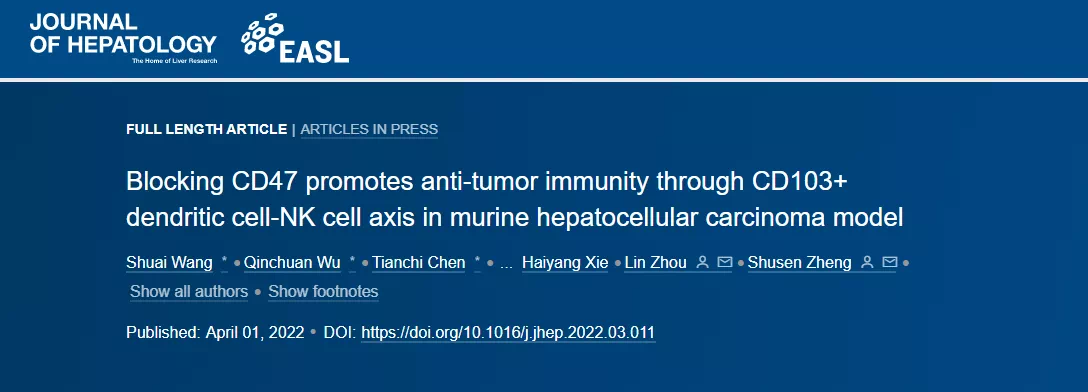On April 1st, 2022, the team of Academician ZHENG Shusen from the First Affiliated Hospital, Zhejiang University School of Medicine published “Blocking CD47 promotes anti-tumor immunity through CD103+ Dendritic Cell-NK Cell Axis in murine hepatocellular carcinoma model" in Journal of Hepatology (IF=25.08). The study demonstrates that hypoxia is prevalent in hepatocellular carcinoma (HCC) microenvironment and promoted CD47-blockade-induced phagocytosis of CD103+DCs. In addition to the classical DC-T axis, CD47-blockade enhanced anti-tumor efficacy by triggering CD103+ Dendritic Cells (DCs)-Natural Killer (NK) Cells Axis via intrinsic STING activation of CD103+ DCs. NK cells were activated and recruited by CD103+ DC derived IL-12 and CXCL9.

The CD47-signaling regulatory protein alpha (SIRPα) axis can participate in the process of tumor immune escape by hindering the phagocytosis of dendritic cells (DCs). However, the behavior of dendritic cells in the tumor microenvironment of hepatocellular carcinoma (HCC) after CD47 blockade treatment and the potential interactions between dendritic cells and natural killer cells (NK cells) remained unclear. This study demonstrated that CD47 blockade triggered CD103+ DC phagocytosis and enhanced STING pathway activation. They observed the overexpression of CD47 in HCC specimens with high HIF-1α expression; CD47 overexpression was accompanied by decreased CD103+ DC and NK cell numbers, which were associated with poor prognosis. Consistently, in an orthotopic liver tumor model, CD47 blockade enhanced NK cell recruitment and activation due to the secretion of CXCL9 and IL-12 by CD103+ DCs, and this effect was abolished by CD103+ DC depletion (Batf3-/- mice) and IL-12 blockade in vivo. Furthermore, a STING inhibitor and STING deficient CD103+ BMDC notably reversed the effect of CD47 blockade, suggesting that STING pathway activation was crucial for the secretion of CXCL9 and IL-12 by CD103+ DCs. Moreover, they observed that the antitumor efficacy of CD47 blockade still occurred in the absence of T cells, suggesting that the CD103+ DC-NK cell axis is an efficient pathway in addition to the DC-T cell axis in an orthotopic liver tumor model. Overall, the CD103+ DC-NK cell axis serves as an independent pathway that is involved in antitumor processes and contributes to a favorable response to CD47 blockade in HCC.

China has the highest morbidity of HCC in the world. For HCC patients in early stage disease, surgical resection is the best treatment strategy, but most patients in advanced stages lose the opportunity for surgery. Due to the limitations of the current targeted drugs Sorafenib and Regorafenib, immune "brake point" drugs provide a potential treatment for patients in advanced stages. CD47 blockade could be a promising strategy for HCC treatment. Although anti-CD47 mAb (Hu5F9-G) is being investigated in patients with solid tumors and Hodgkin's lymphoma in a phase I trial, the mechanism and efficacy of this approach in HCC need to be explored. To evaluate the efficacy of anti-CD47 mAbs in HCC patients, clinical data should be collected. Collectively, our work provides insight into the effects of CD47 blockade in HCC treatment and reveals the potential strategy of targeting NK cells and the STING pathway. Considering the safety and efficacy of anti-CD47 mAb, its combination with other ICBs for HCC treatment seems feasible.
More information: Ph.D. WANG Shuai is the first author of this article. Professor ZHENG Shusen is the corresponding author of this article. This work was funded by supported by Innovative Research Groups of National Natural Science Foundation of China, National S&T Major Project, Research Unit Project of Chinese Academy of Medical Sciences and Major program of National Natural Science Foundation of China.
Click here to read the original article.


